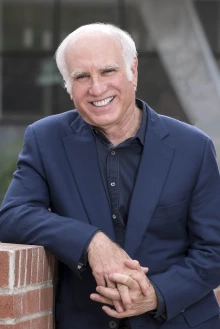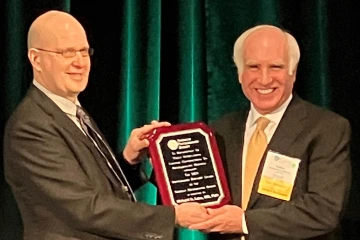Richard D. Lane honored by American Psychosomatic Society
Richard D. Lane, MD, PhD, a professor of psychiatry at the University of Arizona College of Medicine – Tucson, received the American Psychosomatic Society’s Distinguished Scientist Award for 2024. The award is presented to “senior scientists and physicians who have made an important and protracted contribution in any research field within the society’s bailiwick,” according to its website.

Richard D. Lane, MD, PhD
“APS is an organization of more than 700 talented researchers and scholars who all pursue excellence, so it is extremely gratifying to be given the society’s highest honor,” said Lane, who also has faculty appointments in the departments of psychology and neuroscience in the College of Science. “I was simply doing what interested me most, was grateful to have a forum to meet with like-minded investigators and did all I could to help the society pursue its mission.”
Lane was nominated for the Distinguished Scientist Award by Hugo D. Critchley, MBChB, DPhil, chair of psychiatry and head of neuroscience at Brighton and Sussex Medical School in the United Kingdom.
In his nomination letter, Critchley wrote: “Richard has made profound and sustained contributions to psychosomatic research. He is a consummate physician-scientist who has made notable contributions in neuroscience, psychophysiology, cardiology, psychology, psychiatry and psychotherapy, but each is an expression of his overarching goal of advancing knowledge and clinical practice in psychosomatic medicine.”
The nomination letter was co-signed by a dozen of the society’s past leaders.
“The common theme of my research has been the relation between emotions and health,” Lane said.
He has studied this relation in several ways including psychological inventories, manifestation in the body physiologically, bidirectional brain processing of emotional information, emotional processing abnormalities contribution to psychiatric and systemic medical disorders, and how interventions that alter emotional processing can influence mental and physical health outcomes.

Richard D. Lane, MD, PhD (right) receives the American Psychosomatic Society’s Distinguished Scientist Award from Hugo D. Critchley, MBChB, DPhil, who also nominated him for the award. (Courtesy of Richard D. Lane)
Lane was named a fellow of the APS last year. He served as society president from 2005 to 2006 and was on the APS council for nine years. He has also led a number of society initiatives, including promoting neuroscience research in psychosomatic medicine and creating a “Young Investigator Colloquium” at the annual meeting that helps early career scientists get their first grants.
“I have found APS to be a continuously supportive and inspiring environment as well as a source for many very fruitful national and international collaborations.”
Lane, who joined UArizona Health Sciences in 1990, said, “This university has been my home base and has provided an indispensable intellectual and technical infrastructure that has enabled me to meaningfully contribute to my field of interest.
“Working in so many areas, it has been essential to work with collaborators, often a whole team. These teams consist of senior, midcareer and junior scientists as well as research assistants, trainees and administrative professionals who actually execute the day-to-day work. I am grateful to all of them and want to share this honor with them.”
Lane also expressed gratitude for his life partner and fellow College of Medicine – Tucson professor of psychiatry, Karen Weihs, MD.
“Karen and I are in a continuous conversation about any and all aspects of our professional and personal lives,” Lane said. “There is no question that she has enabled me to reach my full potential and I couldn’t be more appreciative of her love, support, good judgment and guidance.”

